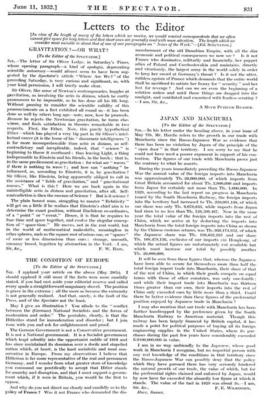Letters to the Editor
Fin view of the length of many of the letters which we receive, we would remind correspondents that we often cannot give space for long letters and that short ones are generally read with more attention. The length which we consider most suitable is about that of one of our paragraphs on " News of the Week."--[Ed. Serarraroa]
GRAVITATION ?—OR WHAT?
[To the Editor of the SPECTATOR.] SIR,—The letter of Sir Oliver Lodge, in Saturday's Times, whose opening paragraph—a kind of apologia, deprecating scientific autocracy—would almost seem to have been sug- gested by the Spectator's article "Where Arc We?" of the preceding Saturday, is very curious and significant, as, with your kind permission, I will briefly make clear.
Sir Oliver, like some of Newton's contemporaries, boggles at gravitation, RS involving the actio in distans, which he curtly pronounces to be impossible, as he has done all his life long. Without pausing to consider the scientific validity of this prommeiatnento on a fact exhibited all round us—it has been done so well by others long ago—note, now, how he proceeds. Because he rejects the Newtonian gravitation, he turns else- where. and finds satisfaction in theories remarkable in two respects. First, the Ether. Now, this purely hypothetical Ether- —which has played a very big part in Sir Oliver's intel- lectual career (it is the home of his disearnate intelligences ") is far more incomprehensible than mil° in distans, so self- contradictory and inexplicable, indeed, that " science " is beginning to throw it overboard : thus leaving Light, a thing indispensable to Einstein and his friends, in the lurch ; that is, in the same predicament as gravitation : for what are" waves" if there is nothing to wave ? ; and how can " nothing " be influenced, as, according to Einstein, it is, by gravitation ? Sir Oliver, like Einstein, being apparently obliged to call in the assistance of "fields of gravitation," and " gravitational masses." What is this ? Here we are back again in the unintelligible actio in distans and gravitation, after alL Self- contradiction is then the essence of Science ? But is it science ?
The plain honest man, struggling to master " Relativity " will get on a little if he realizes that Einstein's chief aim is to determine the exact position, without Euclidean co-ordinates, of a "point" or "event." Hence, it is that he requires to fuse time and space together, and evolve the singular concep- tion of "space-time." He moves, not in the real world, but in the world of mathematical makeshifts, meaningless in other spheres, such as the square root of minus one, or "spaces" of more or less dimensions than ours : strange, uncouth, uncanny brood, begotten by abstraction in the N'oid.—I arn,


































 Previous page
Previous page